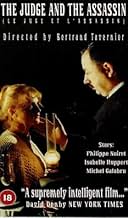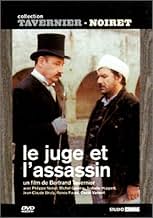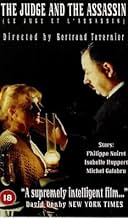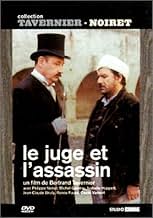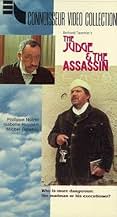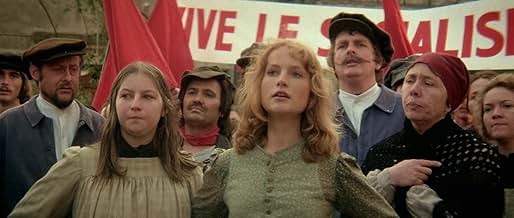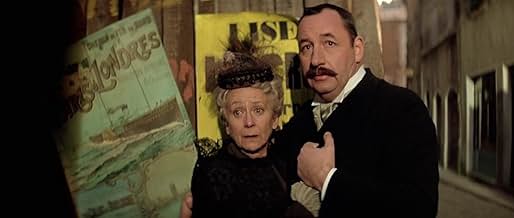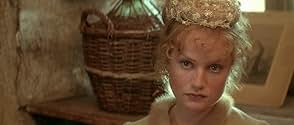AVALIAÇÃO DA IMDb
7,3/10
2,5 mil
SUA AVALIAÇÃO
Adicionar um enredo no seu idiomaAn unstable former French Sergeant commits many atrocities. A judge considers how this case could benefit or damage his career.An unstable former French Sergeant commits many atrocities. A judge considers how this case could benefit or damage his career.An unstable former French Sergeant commits many atrocities. A judge considers how this case could benefit or damage his career.
- Direção
- Roteiristas
- Artistas
- Prêmios
- 3 vitórias e 4 indicações no total
Jean-Claude de Goros
- Dr. Dutourd
- (as Jean-Claude de Gorros)
Avaliações em destaque
A French provincial town in the late 1890's where a Judge attempts to advance his political power by trying to prove that a soldier was not insane at the time of committing murder, which means soilder gets the guillotine and not the mad house. A movie that is more about the social turmoil in France.
A very cursory appraisal of the film would term it as a tale of a true murderer and rapist who killed, raped and sodomized over a dozen shepherd women in rural France before being captured and guillotined. The film is much more than that. The film is more about the respected, educated judges of France who sit in judgement of the evils of less privileged evil-doers, while they are more evil in their actions and scoff at the writings of Emile Zola, that strikes a chord with the average French citizens. One judge is called "Judas" by prisoner who has been tricked, another commits suicide as he reflects on his own past actions that mirror the actions of another. Religion plays a major but discrete role--free lunches for the poor and illiterate are free only if petitions that serve the rich are signed. A judge helps a sibling of an Asian he has condemned to death by ensuring the sibling becomes a Christian and serves him for the rest of his life. Anti-Jewish posters are pasted on outer church walls. Social comments include unwritten restrictions of a Frenchwoman being allowed to marry an Asian. A judge's mother of higher classes, providing cherries in brandy to a lower-class worker but not readily approving her to be the daughter-in-law marked by a silent disapproval when she is brought home. A judge avoids visiting his girlfriend's daughter in hospital but brings flowers for the sick person. The film is less about the "assassin" and more about real life judges and other rich individuals who "judge" the less privileged.
The film is top-notch French cinema, with notable direction and casting, a superb screenplay, good cinematography and fine performances. Tavernier and Noiret made a great team, ever since Tavernier's debut film "The Clockworker of St Paul." It is a pity that this work of Tavernier is rarely discussed and appreciated.
The film is top-notch French cinema, with notable direction and casting, a superb screenplay, good cinematography and fine performances. Tavernier and Noiret made a great team, ever since Tavernier's debut film "The Clockworker of St Paul." It is a pity that this work of Tavernier is rarely discussed and appreciated.
I can't make a real judgment on this film, although the other reviews are rave ones. I just want to add that the story is based on an actual case of the 1890s in France. Joseph Vacher was the real life murderer who is the basis for Michel Galabrue's Joseph Bouvier. Like Vacher he was a former soldier, and he went about the countryside slaughtering young boy shepherds and young girl servants. His destruction of these victims (in terms of mutilations) rivaled his contemporary Jack the Ripper (Vacher was known as Vacher the Ripper). Although he was quite insane the public demanded a death penalty - he was guillotined in 1898. His crimes briefly took public attention off the matter of Captain Alfred Dreyfus.
The Philippe Noiret character is partly based on the noted criminologist Professor Alexander Lacassagne, who (despite considerable evidence of insanity) determined that Vacher was sane, and deserved the death penalty.
The Philippe Noiret character is partly based on the noted criminologist Professor Alexander Lacassagne, who (despite considerable evidence of insanity) determined that Vacher was sane, and deserved the death penalty.
Director Bertrand Tavernier and actor Philippe Noiret collaborated in 9 films. The 1976 'Le juge et l'assassin' is the third film they made together and is a remarkable film in many ways. The story takes place in the last decade of the 19th century, in a France that is still living through the trauma of the Paris Commune and the defeat in the Franco-Prussian war, a country deeply divided by the Dreyfuss case, crushed by social inequalities that gave impetus to the socialist movement but also encouraged anarchist groups and terrorist attacks. Against this background, Bertrand Tavernier together with Pierre Bost and Jean Aurenche wrote the screenplay of a film describing the case of a serial killer, a kind of French Jack the Ripper, focusing on the characters of the criminal and of the judge who does everything to catch and condemn him.
Sergeant Joseph Bouvier is a veteran of the wars of France. He loves a young woman who rejects him, and in desperation he decides to kill her and commit suicide. Neither the assassination nor the suicide succeed, he is declared irresponsible, but after a few years the doctors consider him cured and release him. Adopting a vagabond life, prey to chronic physical and mental suffering and a morbid mysticism, he crosses France from North to South, killing and raping 12 victims on his way, most of them children or teenagers. Judge Emile Rousseau leads a typical bourgeois life in a provincial town, with a possessive mother and a mistress of lower social status. The Bouvier case gives him an opportunity to stand out, but to do so he must secure a conviction, prevent the serial killer from being declared insane, and turn him into a symbol of all that is rotten in France. Sort of a serial killer Dreyfuss. The confrontation between the two is not just a meeting between an accuser and a criminal. Rousseau has on his side not only the intelligence and cunning that will enable him to win Bouvier's confidence, but also a whole legal and political machine at the service of a social class that fears the changes that will sooner or later take place . In the end it is a confrontation between two faces of France, both corrupt and destructive.
Philippe Noiret is, of course, formidable as always. The role of the cunning, ariviste and morally corrupt judge suits him perfectly. The most remarkable acting performance, however, belongs to Michel Galabru, an actor who until then had only made himself known on screens in comic roles (among them a gendarme from Louis de Funès' troupe in Saint-Tropez). The role of Bouvier allows Galabru to create a complex character, in which madness mixes with passion, mystical fervor with intellectual poetry. The cast also features Isabelle Huppert, who at 23, in the secondary role of Rose, the judge's mistress, was beautiful and already master of that mysterious expression that would mark her great roles to come. Bertrand Tavernier has always known how to collaborate with classy professionals. Pierre-William Glenn's cinematography is impressive, especially in the nature scenes. Philippe Sarde's music plays a very important role. There are several sung scenes in the film - by an officer declaiming a patriotic song about lost Alsace and Lorraine, by a troubadour singing a ballad to the murderer-turned-folk-hero, by working women demonstrating for their rights in the final scene. These, together with the very carefully designed sets and costumes, make 'Le juge et l'assassin' an extremely expressive film in rendering the atmosphere of the era. The biggest problem with the script is the overly obvious rhetoric, which doesn't want to leave any doubt about the political views of the screenwriters and of the director. I didn't think that was necessary. The story itself is quite strong and speaks for itself, and the level of acting plus the Noiret - Galabru duel are expressive enough without being explicit. Bertrand Tavernier could have let the cinema art that he mastered so well tell the whole story. It would have been sufficient.
Sergeant Joseph Bouvier is a veteran of the wars of France. He loves a young woman who rejects him, and in desperation he decides to kill her and commit suicide. Neither the assassination nor the suicide succeed, he is declared irresponsible, but after a few years the doctors consider him cured and release him. Adopting a vagabond life, prey to chronic physical and mental suffering and a morbid mysticism, he crosses France from North to South, killing and raping 12 victims on his way, most of them children or teenagers. Judge Emile Rousseau leads a typical bourgeois life in a provincial town, with a possessive mother and a mistress of lower social status. The Bouvier case gives him an opportunity to stand out, but to do so he must secure a conviction, prevent the serial killer from being declared insane, and turn him into a symbol of all that is rotten in France. Sort of a serial killer Dreyfuss. The confrontation between the two is not just a meeting between an accuser and a criminal. Rousseau has on his side not only the intelligence and cunning that will enable him to win Bouvier's confidence, but also a whole legal and political machine at the service of a social class that fears the changes that will sooner or later take place . In the end it is a confrontation between two faces of France, both corrupt and destructive.
Philippe Noiret is, of course, formidable as always. The role of the cunning, ariviste and morally corrupt judge suits him perfectly. The most remarkable acting performance, however, belongs to Michel Galabru, an actor who until then had only made himself known on screens in comic roles (among them a gendarme from Louis de Funès' troupe in Saint-Tropez). The role of Bouvier allows Galabru to create a complex character, in which madness mixes with passion, mystical fervor with intellectual poetry. The cast also features Isabelle Huppert, who at 23, in the secondary role of Rose, the judge's mistress, was beautiful and already master of that mysterious expression that would mark her great roles to come. Bertrand Tavernier has always known how to collaborate with classy professionals. Pierre-William Glenn's cinematography is impressive, especially in the nature scenes. Philippe Sarde's music plays a very important role. There are several sung scenes in the film - by an officer declaiming a patriotic song about lost Alsace and Lorraine, by a troubadour singing a ballad to the murderer-turned-folk-hero, by working women demonstrating for their rights in the final scene. These, together with the very carefully designed sets and costumes, make 'Le juge et l'assassin' an extremely expressive film in rendering the atmosphere of the era. The biggest problem with the script is the overly obvious rhetoric, which doesn't want to leave any doubt about the political views of the screenwriters and of the director. I didn't think that was necessary. The story itself is quite strong and speaks for itself, and the level of acting plus the Noiret - Galabru duel are expressive enough without being explicit. Bertrand Tavernier could have let the cinema art that he mastered so well tell the whole story. It would have been sufficient.
And with him,the French cinema regained all that it had lost with the nouvelle vague:magnificent cinematography(I urge everybody to see this film in a movie theater),elaborate screenplays,Clouzot's Renoir's and Duvivier's bite ,all that made once the French cinema great."Le juge et l'assassin " is his sophomore effort ,after "l'horloger de Saint- Paul",but it was one which firmly and finally placed Tavernier among the greatest,most ambitious artists of the French cinema.
First of all,he did with Michel Galabru -who used to play in mediocre comedies - what Claude Chabrol did with Jean Yanne ("le boucher" "que la bete meure") :this actor is playing his lifetime part,revealing a talent which one would never expect from him.
France,end of the nineteenth century;anti-Semitism is rampant :twice ,a poster appears :"La croix (the cross): a paper against the Jews as no one can";Brialy's character:"we all need an outlet for our bad deeds:I have chosen the Jews,because it's safe";Renée Faure,the judge's good mother,serving the "mercy bouillon" to the Poor,provided that they sign a petition against captain Dreyfus .After the 1870 war,France was humiliated and the song a buck officer sings speaks volumes about the loss of Alsace and Lorraine.A world which Zola -whose books were burned- depicted ,where 2,500 children died in the coal mines... The killer killed 12 of them..
This is not a serial killer who comes out of the blue.Tavernier takes time to describe his mind :he was bitten by a rabid dog (or more like as one scene in a church tells us ,he was raped by a priest),he served in the army but was discharged,and mainly the girl he loved did not want him anymore.He tried to kill her and to take his own life but he failed twice,and in the asylum,they wrecked his brain.Although he is a killer,he is actually a political prisoner:he realized that as far his crimes were concerned ,the blame had to be put on a criminal society:in a remarkable scene ,the judge's mother reads the reports concerning the awful crimes as if she 's reading the tittle-tattle of the town.The serial killer identifies himself with Jesus and Joan of Arc ...
In direct contrast to hîm,we have the judge :admirably portrayed by Tavernier's favourite actor ,Philippe Noiret,he epitomizes the bourgeoisie,the man who wants to keep the world as it is;this is a very complex opaque character:nearing 50,he stills lives with his mother,and he's got nasty habits (see the scene when he buggers Isabelle Huppert).
There are a lot of things to say about "le juge et l'assassin":the film successfully recreates the atmosphere of the period,not only by its hints at Dreyfus,at a country which is bent on revenge ,at a Church which feels its power slip away (the priest thundering against "school without God" ,about 10 years after Jules Ferry instituted secular education,and about 10 years before the separation of the Church and the State in France).But it even recreates it with its original songs ,which is quite a feat.We really feel we are in the time machine,and that's the main reason why Tavernier's movie is so precious:no one can find echoes of the seventies in France,which would have dated and marred the film.Even if the socialists appear at the end of the movie,there's no connection with their impending coming in the eighties.
A masterpiece ,Tavernier's best film along with "la vie et rien d'autre".
First of all,he did with Michel Galabru -who used to play in mediocre comedies - what Claude Chabrol did with Jean Yanne ("le boucher" "que la bete meure") :this actor is playing his lifetime part,revealing a talent which one would never expect from him.
France,end of the nineteenth century;anti-Semitism is rampant :twice ,a poster appears :"La croix (the cross): a paper against the Jews as no one can";Brialy's character:"we all need an outlet for our bad deeds:I have chosen the Jews,because it's safe";Renée Faure,the judge's good mother,serving the "mercy bouillon" to the Poor,provided that they sign a petition against captain Dreyfus .After the 1870 war,France was humiliated and the song a buck officer sings speaks volumes about the loss of Alsace and Lorraine.A world which Zola -whose books were burned- depicted ,where 2,500 children died in the coal mines... The killer killed 12 of them..
This is not a serial killer who comes out of the blue.Tavernier takes time to describe his mind :he was bitten by a rabid dog (or more like as one scene in a church tells us ,he was raped by a priest),he served in the army but was discharged,and mainly the girl he loved did not want him anymore.He tried to kill her and to take his own life but he failed twice,and in the asylum,they wrecked his brain.Although he is a killer,he is actually a political prisoner:he realized that as far his crimes were concerned ,the blame had to be put on a criminal society:in a remarkable scene ,the judge's mother reads the reports concerning the awful crimes as if she 's reading the tittle-tattle of the town.The serial killer identifies himself with Jesus and Joan of Arc ...
In direct contrast to hîm,we have the judge :admirably portrayed by Tavernier's favourite actor ,Philippe Noiret,he epitomizes the bourgeoisie,the man who wants to keep the world as it is;this is a very complex opaque character:nearing 50,he stills lives with his mother,and he's got nasty habits (see the scene when he buggers Isabelle Huppert).
There are a lot of things to say about "le juge et l'assassin":the film successfully recreates the atmosphere of the period,not only by its hints at Dreyfus,at a country which is bent on revenge ,at a Church which feels its power slip away (the priest thundering against "school without God" ,about 10 years after Jules Ferry instituted secular education,and about 10 years before the separation of the Church and the State in France).But it even recreates it with its original songs ,which is quite a feat.We really feel we are in the time machine,and that's the main reason why Tavernier's movie is so precious:no one can find echoes of the seventies in France,which would have dated and marred the film.Even if the socialists appear at the end of the movie,there's no connection with their impending coming in the eighties.
A masterpiece ,Tavernier's best film along with "la vie et rien d'autre".
Você sabia?
- CuriosidadesThis is a fairly straight-forward account of the crimes of Joseph Vacher. "Vacher" and "Bouvier" both mean "cowherd" in French. The names of many of the characters - like Lacassagne - have not been changed.
- Erros de gravaçãoYou can see the shadow of the microphone and the boom moving across the wall of the chapel where the priest is giving his sermon about five minutes after the beginning.
- ConexõesFeatured in Keskiyön auringon kuvat (1987)
- Trilhas sonorasLa Complainte de Bouvier l'Éventreur
Music by Philippe Sarde
Lyrics by Jean-Roger Caussimon
Performed by Jean-Roger Caussimon
Principais escolhas
Faça login para avaliar e ver a lista de recomendações personalizadas
- How long is The Judge and the Assassin?Fornecido pela Alexa
Detalhes
- Tempo de duração2 horas 8 minutos
- Mixagem de som
- Proporção
- 2.35 : 1
Contribua para esta página
Sugerir uma alteração ou adicionar conteúdo ausente

Principal brecha
By what name was O Juiz e o Assassino (1976) officially released in India in English?
Responda
![Assistir a Bande-annonce [OV]](https://m.media-amazon.com/images/M/MV5BMGRkZTUzMWItY2NmZi00YWFhLTllZTMtZmQzNmFjNmFkY2M5XkEyXkFqcGdeQXRyYW5zY29kZS13b3JrZmxvdw@@._V1_QL75_UX500_CR0)
